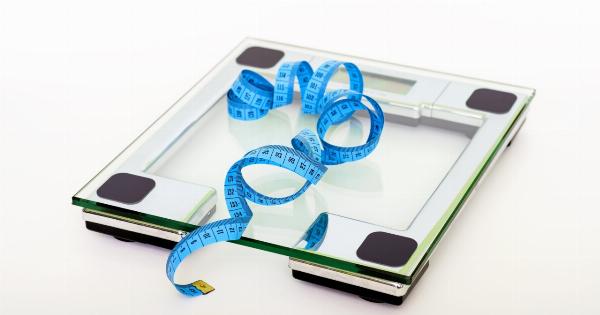Embarking on a weight loss journey can be exhilarating, especially when you start seeing those numbers on the scale drop.
But what happens when the scale suddenly stops moving? It can be demotivating and frustrating to hit a weight loss plateau, but rest assured, this is a common occurrence for many individuals striving to shed those extra pounds. In this article, we will explore the reasons behind weight loss plateaus and provide you with actionable strategies to break through these barriers.
Understanding Why Plateaus Happen
Before diving into solutions, it’s important to understand why weight loss plateaus happen in the first place. During the initial stages of a weight loss journey, your body experiences rapid changes.
As you reduce calorie intake and increase physical activity, your body burns stored fat, resulting in weight loss. However, as your body adjusts to these new habits, it becomes more efficient at conserving energy, making weight loss more challenging over time.
Additionally, muscle plays a crucial role in weight loss. When you lose weight, a portion of the weight lost comes from muscle mass.
Since muscle burns more calories at rest than fat, a decrease in muscle mass means your body requires fewer calories to maintain its current weight, resulting in a decline in the rate of weight loss.
Another contributing factor to weight loss plateaus is the body’s natural adaptation mechanisms. When your body senses that it is losing weight at a rapid rate, it triggers various mechanisms to slow down the process and maintain equilibrium.
These mechanisms, such as a decrease in metabolism, can lead to a plateau.
Strategies to Overcome a Weight Loss Plateau
Now that we understand the reasons behind weight loss plateaus, let’s explore some effective strategies to overcome them:.
1. Reassess Your Calorie Intake
If you’ve hit a weight loss plateau, it may be time to reassess your calorie intake. As your weight decreases, your body’s calorie requirements also decrease. Calculate your current caloric needs and adjust your intake accordingly.
Remember, a moderate calorie deficit is sustainable and promotes steady weight loss.
2. Increase Your Physical Activity
Your body may have adapted to your current exercise routine, causing a plateau. Shake things up by incorporating new forms of exercise or increasing the intensity or duration of your workouts.
Adding strength training exercises can be particularly beneficial, as they help build muscle mass, which in turn boosts your metabolism.
3. Monitor Portion Sizes
Even if you’re consuming healthy foods, overeating can still impede your weight loss progress. Take a closer look at your portion sizes and ensure they align with your caloric goals.
Using measuring cups or a food scale can help you accurately track your portions and avoid unintentional overeating.
4. Keep a Food Journal
A food journal can be a helpful tool in identifying patterns or triggers that may be hindering your weight loss.
Track your meals, snacks, and beverages, including portion sizes and any emotional or environmental factors that may be influencing your eating habits. This self-awareness can help you make necessary adjustments and break through the plateau.
5. Prioritize Protein
Increasing your protein intake can aid in breaking through a weight loss plateau. Protein has a higher thermic effect, meaning your body burns more calories during digestion compared to carbohydrates or fats.
Additionally, protein helps preserve muscle mass during weight loss, ensuring your metabolism remains elevated.
6. Get Sufficient Sleep
Quality sleep is essential for overall health and weight management. Lack of sleep disrupts various hormonal processes in the body, including those related to hunger and satiety.
Aim for at least 7-8 hours of uninterrupted sleep each night to support healthy weight loss.
7. Stay Hydrated
Drinking an adequate amount of water throughout the day can prevent dehydration and promote weight loss. Water boosts your metabolism, helps control cravings, and can increase feelings of fullness, leading to reduced calorie intake.
8. Manage Stress Effectively
Chronic stress can impede weight loss progress by increasing the production of cortisol, a hormone associated with weight gain. Explore stress management techniques such as meditation, deep breathing exercises, or engaging in hobbies that bring you joy.
Prioritizing self-care can help break through weight loss plateaus.
9. Reevaluate Your Goals
If you’ve hit a weight loss plateau for an extended period, it might be time to reevaluate your goals.
Are your expectations realistic? Remember that sustainable weight loss is a journey, and your body might need more time to adjust or reach a certain weight. Focus on the positive changes you’ve made in your habits and overall well-being rather than solely fixating on the number on the scale.
10. Consult a Healthcare Professional
If you’ve tried various strategies and are still unable to break through your weight loss plateau, it may be beneficial to consult a healthcare professional or a registered dietitian.
They can assess your individual situation, provide personalized recommendations, and ensure you’re on the right track towards reaching your goals.
The Key Takeaway
Experiencing a weight loss plateau is a common, albeit frustrating, part of the weight loss journey.
By understanding the reasons behind plateaus and implementing the strategies mentioned above, you can break through these barriers and continue progressing towards your goal weight. Remember to stay patient, maintain a healthy mindset, and celebrate the non-scale victories along the way.





























